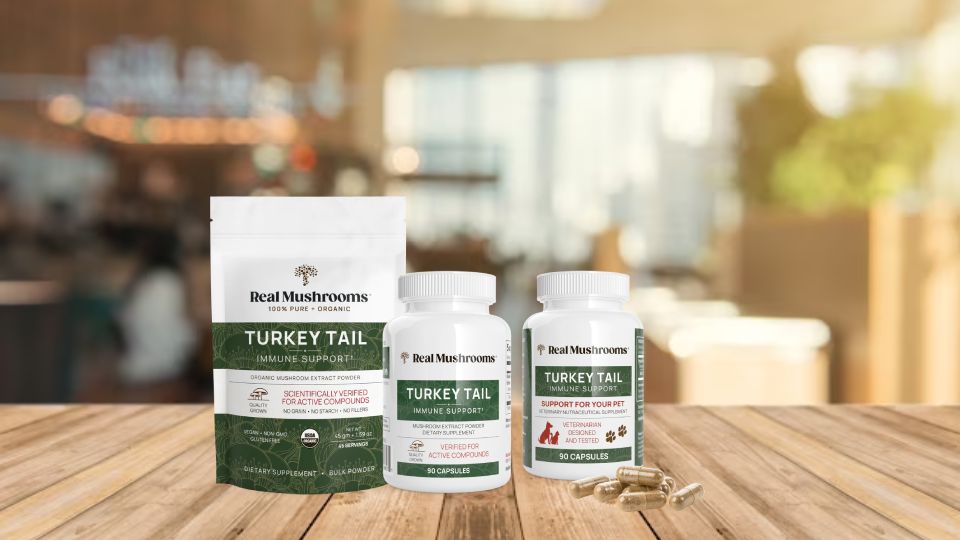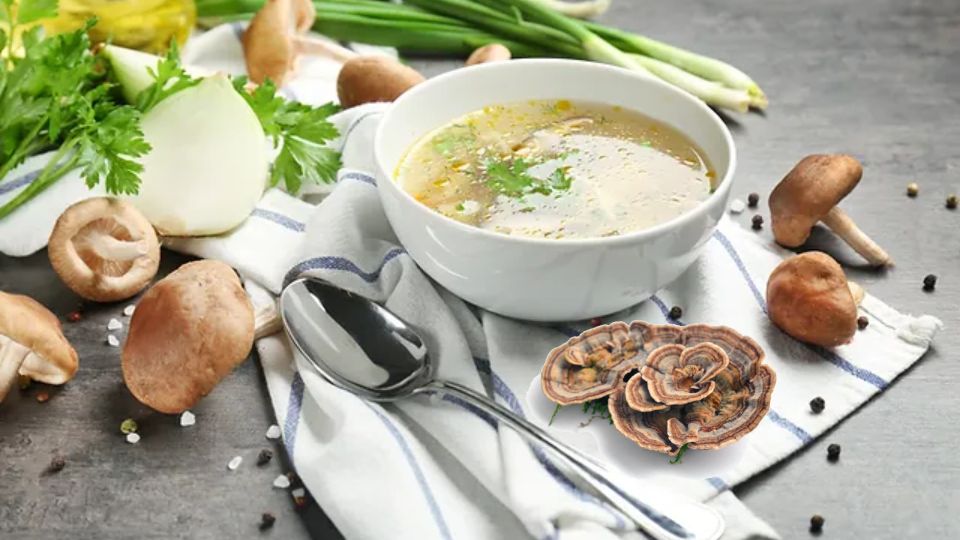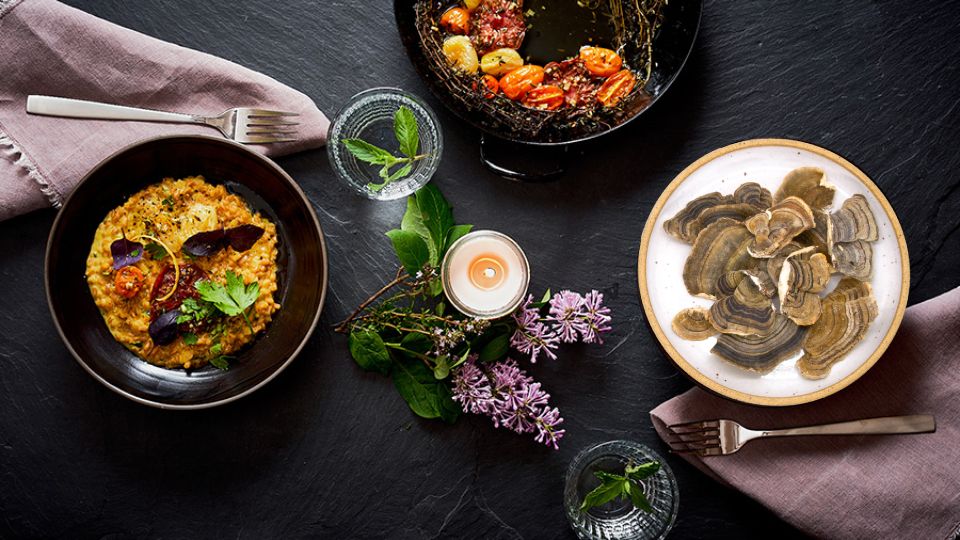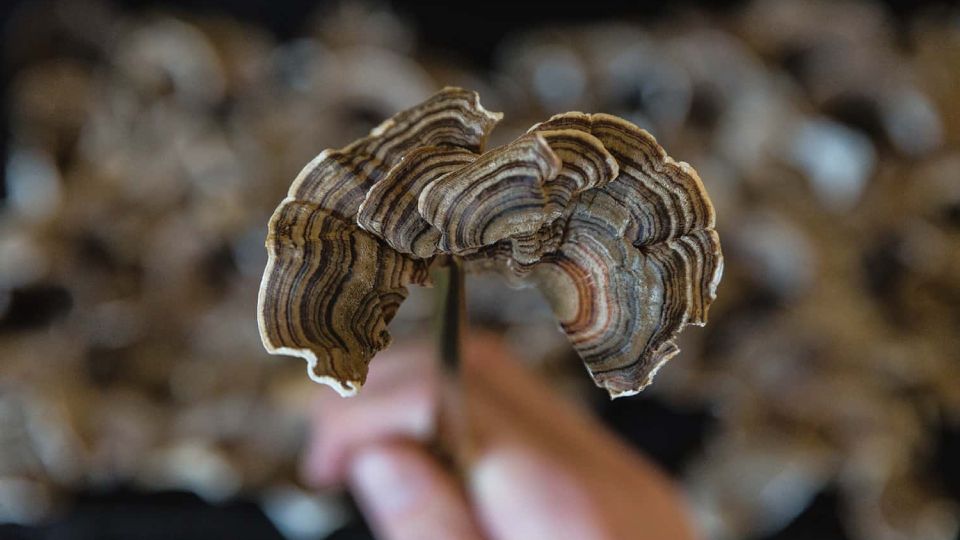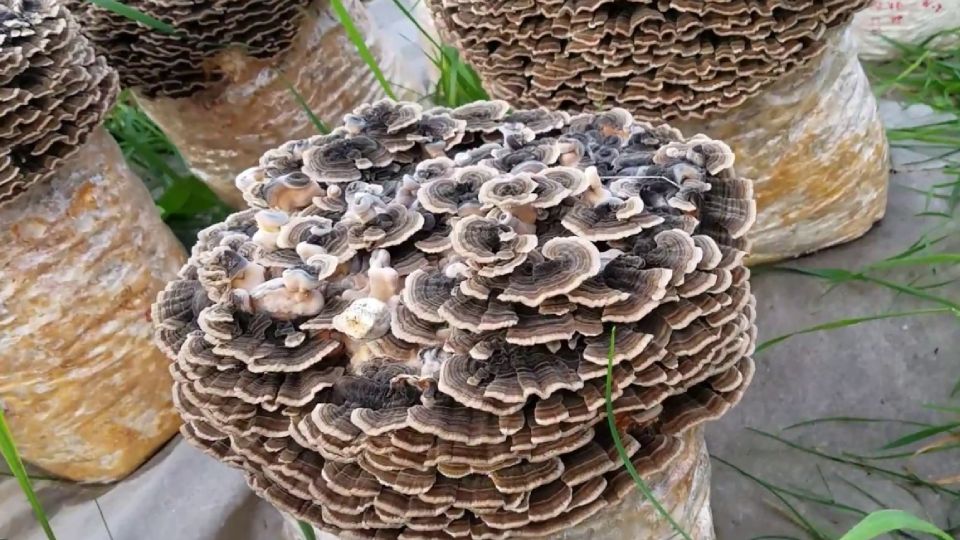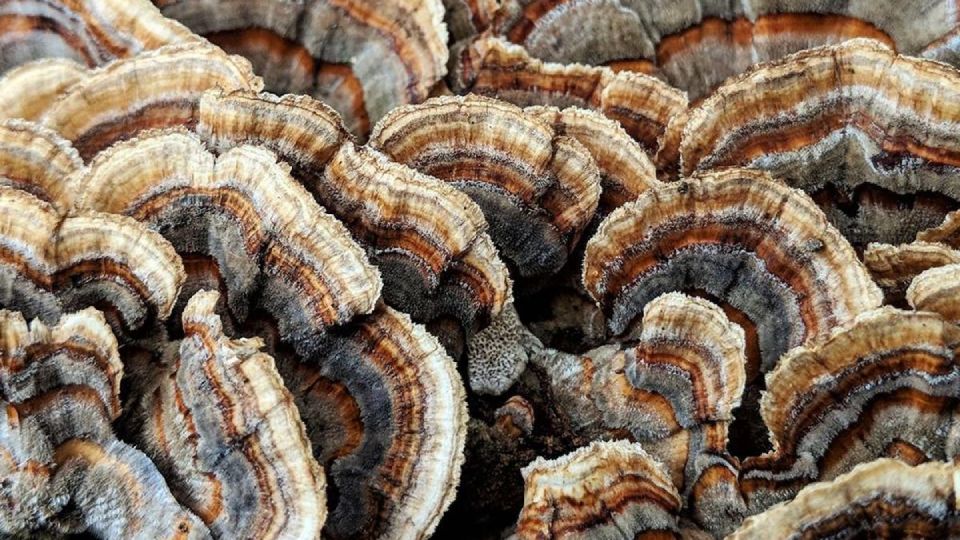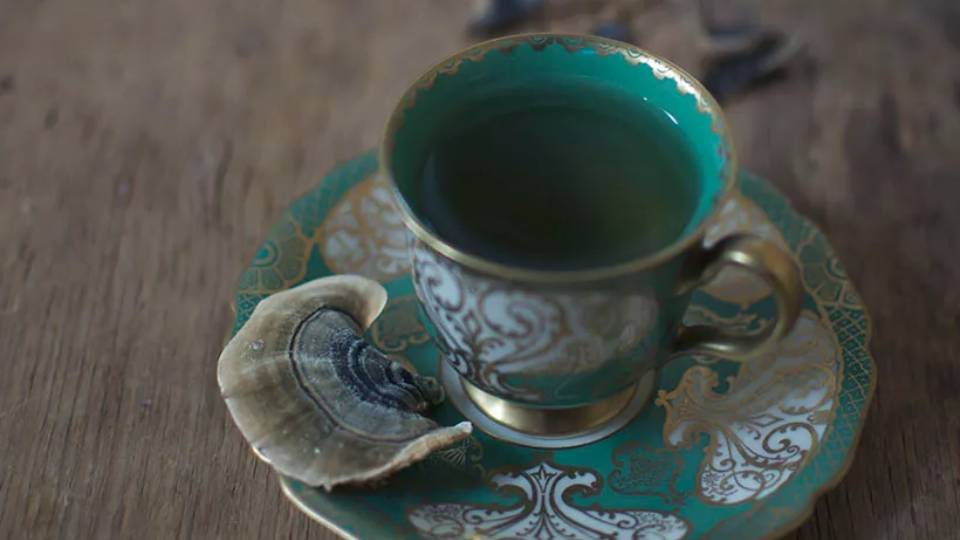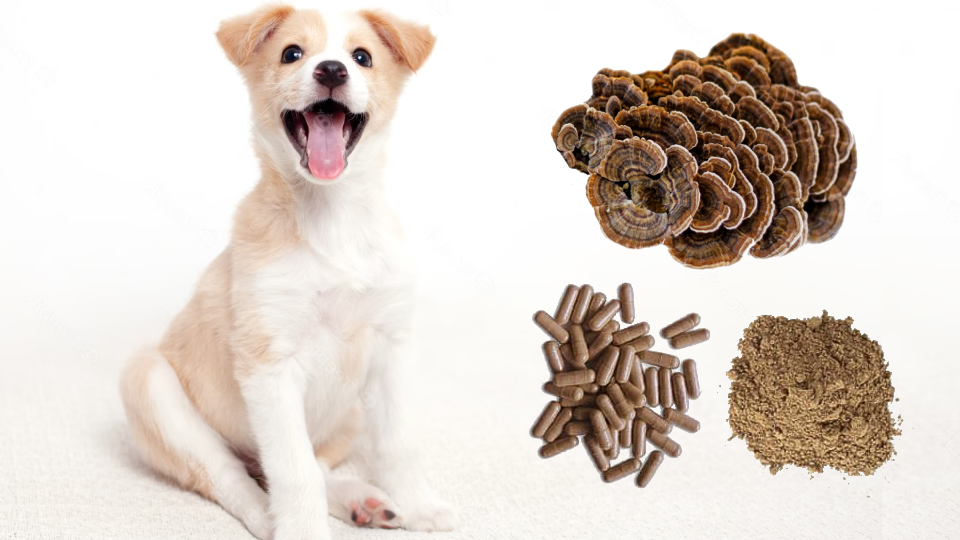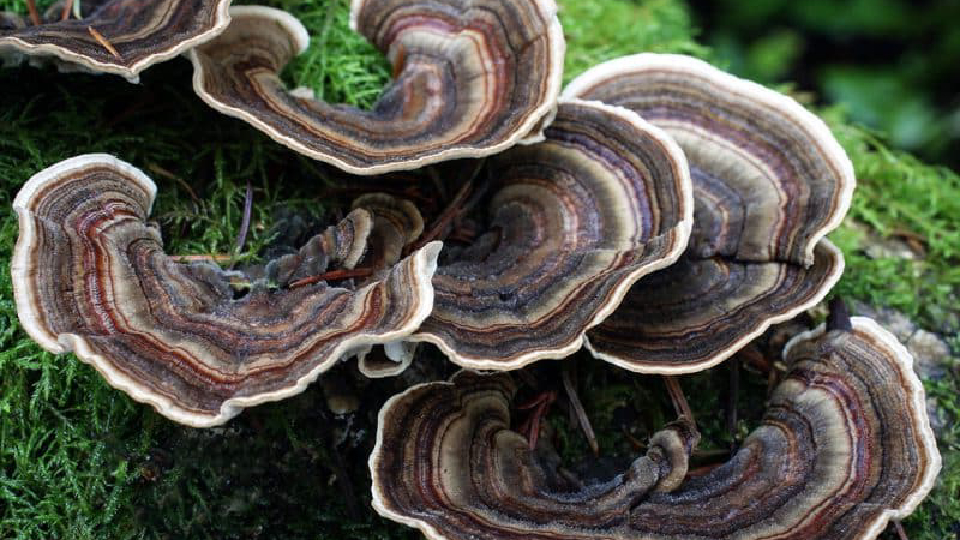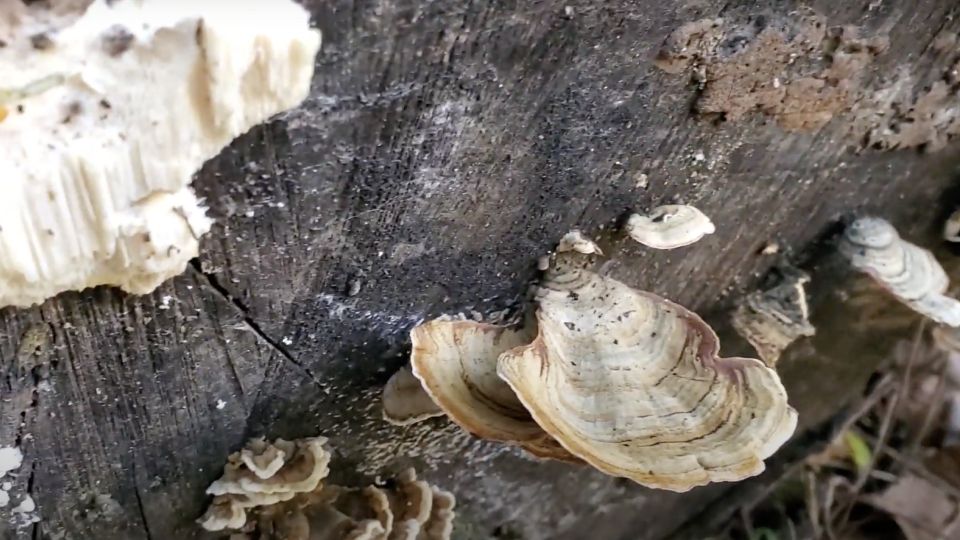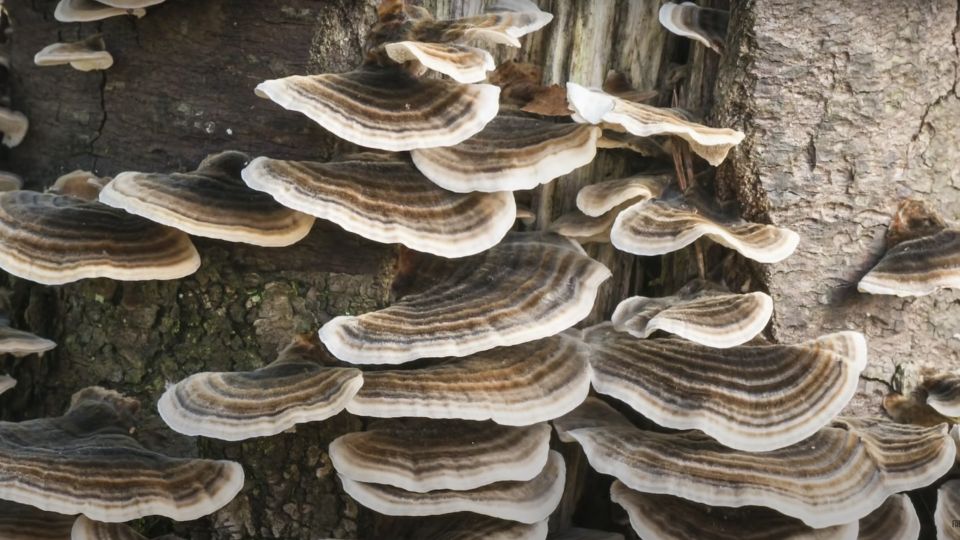
Turkey Tail Mushrooms: A Complete Guide
Turkey tail (Coriolus versicolor) is a medicinal mushroom known for its polysaccharide peptide (PSP) and polysaccharide krestin (PSK) content. These compounds are believed to have beneficial effects in slowing cancer growth and enhancing the immune system.
The turkey tail mushroom thrives on stumps and decomposing wood of trees. Its PSP and PSK components have been studied for their potential to support cancer treatments and improve response to radiation therapy.
Beyond its cancer-related applications, people also use turkey tail mushrooms to address muscle weakness, fatigue, urinary tract infections (UTIs), and other conditions. However, it’s important to note that there is limited scientific evidence supporting these additional uses.
Identify Turkey Tail Mushrooms
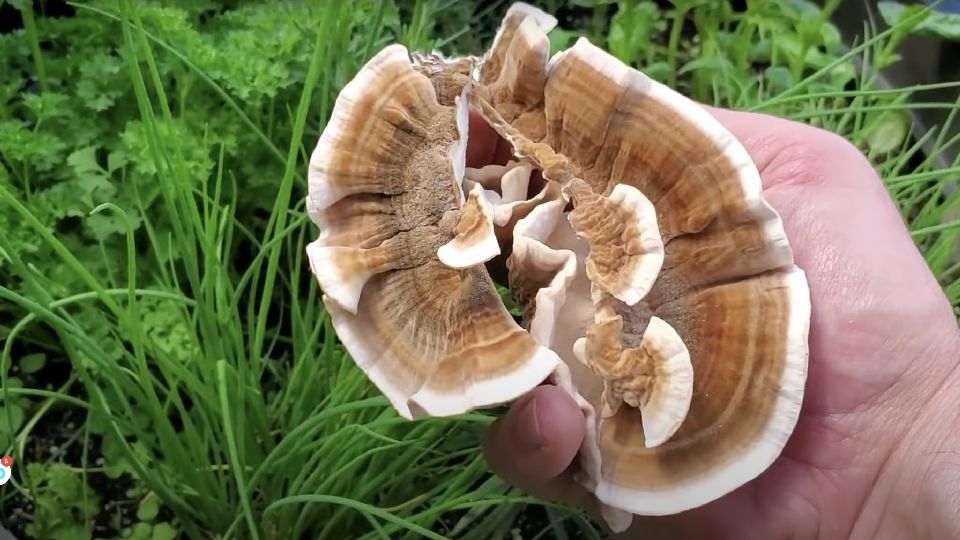
One can identify turkey tail mushrooms by their distinctive colorful and intricate patterns, which range from yellow to blue to deep purple. These mushrooms grow in temperate and subtropical hardwood forests worldwide, commonly found on dead or decaying tree trunks, stumps, and logs. Although edible, their flavor is not very strong.
Belonging to the Basidiomycetes family, which includes other edible mushrooms like shiitake and oyster mushrooms, turkey tail mushrooms have been extensively studied for their medicinal properties. Researchers have discovered various beneficial compounds in them, such as polysaccharides, triterpenes, and phenolic compounds, known for their antioxidant, anti-inflammatory, and immunomodulatory properties.
These mushrooms have gained popularity as ingredients in medicinal mushroom products like teas, tinctures, and capsules. Traditional Chinese medicine also embraces their use, with practitioners believing they can boost the immune system. Besides their medicinal applications, turkey tail mushrooms are used in certain cuisines to provide a pleasant texture and subtle flavor to dishes.
History
Turkey tail mushrooms have been used in traditional Chinese medicine for over 2,000 years. In the Chinese herbal medicine text, Shennong Ben Cao Jing, they were known as Yun Zhi. Similarly, in Japan, these mushrooms were called Kawaratake and were valued for their immune-boosting properties in traditional medicine.
Throughout centuries and across various cultures, turkey tail mushrooms have been treasured for their medicinal benefits. In traditional Chinese medicine, they were used to address conditions like fever, dysentery, and diarrhea, while in Japan, they were employed to alleviate chest pains and respiratory issues. Even the ancient Greek physician Dioscorides recognized their usefulness in treating digestive problems, marking one of the earliest accounts of their therapeutic usage.
In modern times, researchers have taken a keen interest in the potential health advantages of turkey tail mushrooms. Scientific studies have revealed their potential effectiveness in combating cancer, cardiovascular diseases, and other health conditions. This renewed curiosity in the mushrooms’ medicinal properties dates back to the 1970s when scientists began exploring their therapeutic potential.
Health Benefits of Turkey Tail Mushrooms
Recent research has suggested that consuming turkey tail mushrooms may offer a range of health benefits. In a study published in the International Journal of Medicinal Mushrooms, researchers found that they may have the potential to reduce inflammation and improve immune function.
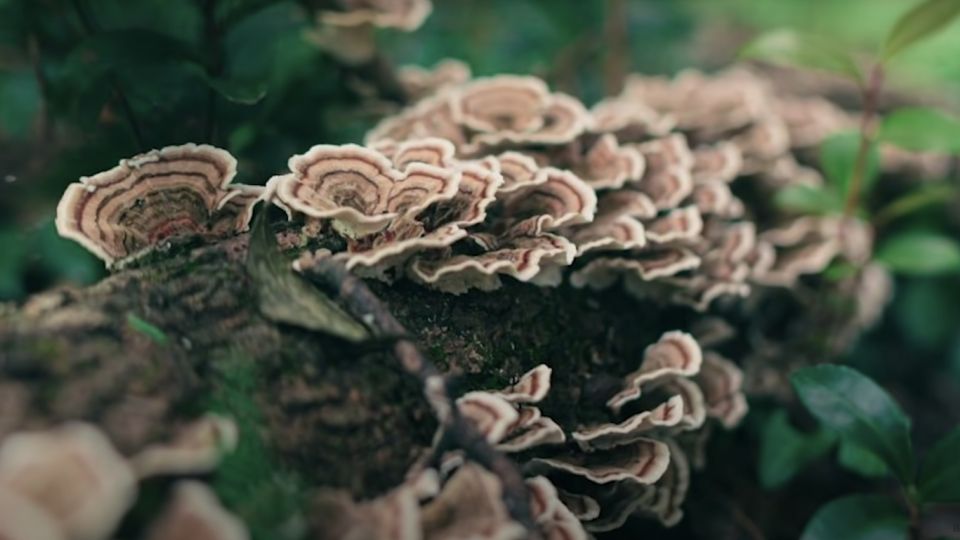
Boosts Immune System
Turkey tail mushroom contains compounds that fortify your immune system, potentially improving its response to cancer treatments and radiation. In Japan, a preparation called krestin, made from turkey tail mushroom, has been used for decades as a supportive therapy in cancer treatment[1].
Improves Gut Health
Maintaining a healthy balance of beneficial bacteria in your gut is crucial for a strong immune system. Your gut bacteria interact with immune cells and directly influence your immune response. Turkey tail contains prebiotics, which nourish these helpful bacteria. Research shows that treatment with turkey tail can have a positive impact on the gut microbiome, similar to prebiotic supplements.
For instance, a test-tube study revealed that turkey tail extract modified gut bacteria composition by increasing populations of beneficial bacteria like Bifidobacterium and Lactobacillus, while reducing potentially harmful bacteria such as Clostridium and Staphylococcus[2].
Anti-Cancer
Similarly, a study published in the Journal of Translational Medicine, found that the mushroom may have the potential to reduce tumor size in mice. This may be due to the presence of polysaccharide peptides in these mushrooms, which have been shown to stimulate the immune system and improve the effectiveness of chemotherapy[3].
Has Antimicrobial Effects
In addition to their potential cancer-fighting properties, they have also been shown to have antimicrobial effects, making them a promising treatment option for respiratory infections. Furthermore, their anti-inflammatory and antioxidant properties may make them a potential treatment for a variety of conditions, including digestive issues and autoimmune disorders[4].
Protects Liver
In traditional Chinese medicine, these mushrooms have been historically utilized to aid with liver disorders like jaundice. Recent studies have revealed that turkey tail mushroom extracts offer protective effects against liver damage, including damage caused by excessive alcohol intake. They achieve this by reducing the accumulation of fat on the liver and lowering inflammation resulting from alcohol consumption.
Improves Metabolism
Turkey tail mushrooms appear to play a role in regulating metabolism, as suggested by research. In one study, diabetic rats that consumed turkey tail experienced a reduction in blood glucose and cholesterol levels. These findings indicate that incorporating these mushrooms into your diet might have positive effects on blood sugar and cholesterol management[5].
It’s essential to keep in mind that while turkey tail mushroom shows potential health benefits, further research is necessary to fully understand its effects on human health.
Its Medical Compounds and Benefits
| Medical Compounds | Description |
|---|---|
| Polysaccharides | Actively support the immune system, with potential cancer-fighting properties, gaining interest in cancer research and immune therapy. |
| Triterpenes | Actively exhibits antioxidant and anti-inflammatory effects, contributing to promoting overall health and well-being. |
| Phenolic Compounds | Actively offer immunomodulatory benefits, regulating the immune system and enhancing its response to infections. |
| Ergosterol | Actively contribute to supporting bone health and various physiological functions as a precursor to Vitamin D. |
| Beta-Glucans | Actively plays a significant role in immune system modulation, is rich in beta-glucans, and has potential anti-tumor activity, promising in cancer treatments. |
| Polypeptides | Actively possess antimicrobial properties, currently under investigation for their potential anti-viral effects, relevant in infectious disease research. |
Ways of Using Turkey Tail Mushrooms
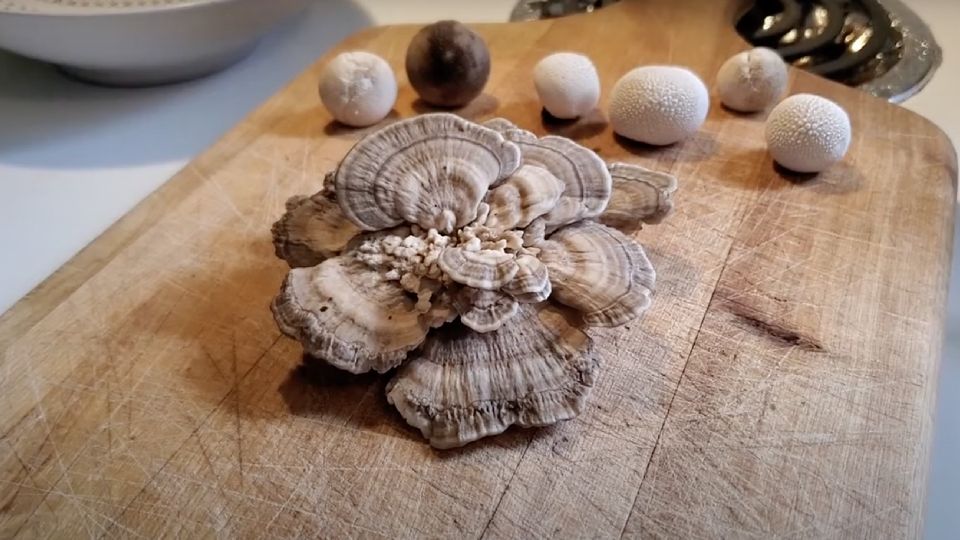
Here are some ways to use turkey tail mushrooms:
- Brew a Turkey tail Tea
- Make a Turkey tail coffee
- Add Turkey tail powder to smoothies, and juices.
- Take a Turkey tail mushroom Supplement
- Add Fresh Turkey tail mushrooms to Soups and Stews
Dosage: How Much Turkey Tail Should I Take?
- Capsules or supplements – A typical recommended dosage is 1,000-3,000 milligrams per day, taken in divided doses. It’s crucial to read and follow the specific dosage instructions on the product label, as the dosages may vary based on the brand and formulation.
- Dosage for tea – Boil 1-2 teaspoons of dried turkey tail mushrooms in 2-3 cups of water for 1-2 hours. Strain the tea and consume 1-2 cups per day.
- Dosage for extract powder – The recommended dosage is 500-1500 milligrams per day, taken in divided doses. It’s important to follow the specific dosage instructions on the product label.
- Dosage for tincture – The recommended dosage for turkey tail tincture is typically 1-2 ml, 2-3 times per day. It is important to follow the dosage instructions on the tincture bottle.
Cordyceps mushrooms are available in various forms, including powders, capsules, and tinctures. Powders and capsules may contain a higher concentration of beneficial compounds than tinctures, so it is important to source supplements from a trusted supplier to guarantee the quality of the product.
Side Effects
Studies have shown that the polysaccharides found in Turkey tail mushrooms can cause allergic reactions in some people, such as skin rashes, itching, hives, and other reactions. Although these reactions are usually mild, it is still important to talk to a healthcare professional if any of these symptoms occur.
Additionally, the lectins found in these mushrooms can cause gastrointestinal distress in some individuals, such as abdominal cramping, bloating, diarrhea, and nausea. It is recommended to start with small doses to reduce the risk of these symptoms.
Finally, The mushroom contains small amounts of the toxic compound monomethylhydrazine (MMH), which can be harmful if ingested in large quantities. MMH is a known carcinogen and can cause liver and kidney damage.
As such, it is important to consume Turkey tail mushrooms in moderation. Therefore, it is important to consult with a healthcare professional before consuming these mushrooms.
Turkey Tail Mushrooms Cultivation
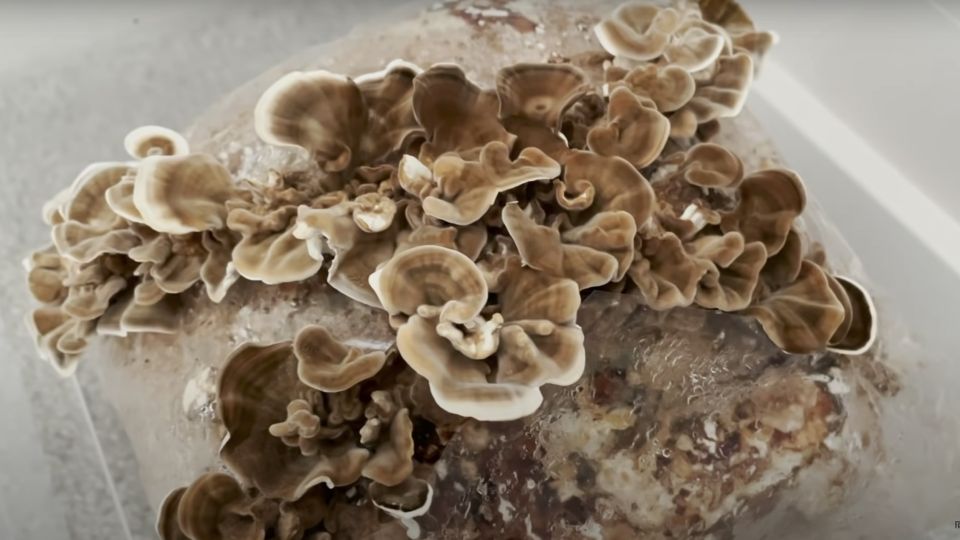
You can easily cultivate turkey tail mushrooms in various substrates like wood, straw, or paper. Just remember to maintain cool temperatures and high humidity levels for optimal growth. Monitoring the environment is crucial throughout the cultivation process.
Ensure the substrate remains sterile to prevent contamination. Pay attention to the amount of light the mushrooms get – too much can bleach them, while too little can hinder fruiting. Harvest the mushrooms when they’re young and fresh to enjoy their best flavor and nutritional benefits.
Keep in mind that cultivating turkey tail mushrooms requires patience. It may take several months for the mycelium to colonize the logs or stumps, and even longer for the mushrooms to start fruiting. But with proper care, you’ll find it a rewarding and sustainable endeavor.
Learn how to grow other medicinal mushrooms.
Turkey Tail Supplements
You can find turkey tail supplements in capsule, powder, gummies, and tincture forms. Some supplements include the entire mushroom, both the fruit body and mycelium (root structure), which is dried and ground into powder. Other supplements offer extracts of the mushroom’s beneficial compounds, providing a concentrated dose of health-supporting elements with a full spectrum of benefits.
When you’re shopping for a high-quality supplement, keep an eye out for the following:
- Clear ingredients label listing all components and amounts.
- Organic, 100% fruiting bodies for the highest beneficial compounds.
- Avoid mycelium, grain, or other fillers.
- Tested by accredited US labs (USP and ConsumerLab) for quality assurance.
- Look for the quality assurance seal on the packaging.
Reading online product reviews can help you find a reputable manufacturer. However, it’s always wise to consult your healthcare provider for advice on choosing the best supplement for you.
The Essential Guide to Turkey Tail Mushrooms
Discover the incredible benefits of Turkey Tail mushrooms with our comprehensive guides. Get a deep understanding of its powerful properties, and how it can enhance your overall health and wellbeing. Our clear and informative resources will provide valuable insights and tips.
- Real Mushrooms Turkey TailReal Mushrooms Turkey Tail Review 2024 *Last updated on Jan 1st, 2024* In today’s Real Mushrooms Turkey Tail review, we’ll explore what’s good and not-so-good … Read more
- Turkey Tail Mushroom RecipeEasy Turkey Tail Mushroom Recipes Are you in search of a delightful turkey tail recipe? Look no further! Today, we’ll explore the amazing health benefits … Read more
- How to Cook Turkey Tail MushroomsHow to Cook Turkey Tail Mushrooms: Healthy & Tasty If you’ve ever foraged for wild mushrooms or have a deep interest in mycology, you might … Read more
- How to Dry Turkey Tail MushroomsHow to Dry Turkey Tail Mushrooms: All You Need to Know As mushroom enthusiasts and foraging enthusiasts, we’re always on the lookout for unique and … Read more
- How to Grow Turkey Tail MushroomsHow to Grow Turkey Tail Mushrooms: A Comprehensive Guide Are you curious about how to grow turkey tail mushrooms at home? If so, you’ve come … Read more
- Where to Buy Turkey Tail MushroomWhere to Buy Turkey Tail Mushrooms? For centuries, traditional Chinese medicine has recognized the benefits of turkey tail mushrooms. These mushrooms, rich in nutrients and … Read more
- Turkey Tail Mushroom TeaTurkey Tail Mushroom Tea: A Delicious Way to Boost Your Immune(With Recipes) Turkey Tail Mushroom Tea has become popular for its health perks. This tasty … Read more
- Turkey Tail Mushroom for DogsTurkey Tail Mushroom for Dogs: Top Benefits and Consideration Turkey tail mushroom has gained popularity as a natural supplement for dogs, offering various health benefits. … Read more
- Turkey Tail Mushroom IdentificationTurkey Tail Mushroom Identification: Benefits, Uses, and More Mastering Turkey Tail Mushroom Identification is crucial since it’s renowned for its medicinal properties, it used in … Read more
- False Turkey Tail MushroomFalse Turkey Tail Mushroom: Everything You Need to Know You can easily confuse the false turkey tail mushroom, also known as Stereum ostrea, with the … Read more
References
1. Turkey Tail Polysaccharide-Peptide Fraction: A Potential Therapeutic Agent for Inflammatory and Immune-Related Diseases. International Journal of Medicinal Mushrooms, 19(9), 729–740. Retrieved from https://doi.org/10.1615/IntJMedMushrooms.2017021229
2. Effects of polysaccharopeptide from Trametes Versicolor and amoxicillin on the gut microbiome of healthy volunteers: A randomized clinical trial. https://www.researchgate.net/publication/263778533_Effects_of_polysaccharopeptide_from_Trametes_Versicolor_and_amoxicillin_on_the_gut_microbiome_of_healthy_volunteers_A_randomized_clinical_trial
3. Improved production and antitumor activity of intracellular protein-polysaccharide from Trametes versicolor by the quorum sensing molecule-tyrosol. https://www.researchgate.net/publication/318752626_Improved_production_and_antitumor_activity_of_intracellular_protein-polysaccharide_from_Trametes_versicolor_by_the_quorum_sensing_molecule-tyrosol
4. In vitro Antimicrobial Activity of Morchella esculenta and Trametes versicolor. https://www.researchgate.net/publication/338169884_In_vitro_Antimicrobial_Activity_of_Morchella_esculenta_and_Trametes_versicolor?_sg=GR8UoKco1gTwAhx2JboBxIGtoEWPzE5-Q5-xVH15Uuer_cxiqizkeRFQVibzcnmkqiC1MY9vd-cV5-0
5. Deciphering the CNS anti-depressant, antioxidant and cytotoxic profiling of methanol and aqueous extracts of Trametes versicolor and molecular interactions of its phenolic compounds. https://www.ncbi.nlm.nih.gov/pmc/articles/PMC8568997/

